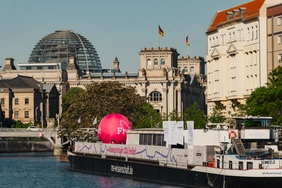The THI exhibit offered visitors the opportunity to experience the advantages and disadvantages of automated driving technologies up close in a driving simulator. Under the direction of Professor Andreas Riener, the ‘Mensch in Bewegung’ project showed how this technology can make traffic safer and more efficient. But it also raised questions: Is there more or less freedom when machines take the wheel?
‘I was on board myself and it was a fantastic experience,’ emphasized Professor Riener. ‘The MS Wissenschaft gave us a unique opportunity to present our research to a wide audience and to stimulate important discussions about the opportunities and challenges of automated driving.’
The exhibit developed especially for the ship by Franziska Hegner, Claus Pfeilschifter, and Markus Weißenberger from the ‘Human-Computer Interaction’ research group was one of the most popular attractions. Many visitors also took part in a survey, the results of which are now being incorporated into the further development of the technology.
In addition to the THI exhibit, there were around 30 other interactive stations on the ‘MS Wissenschaft’ that illuminated the topic of freedom from different angles. In workshops, film evenings, and discussions, visitors were able to delve deeper into the content of the exhibition.
Following the tour, the THI exhibit is now available for further exhibitions and events and will be traveling through the region in the future. It will also be open to the public in the THI auditorium until the 17th of November.



![[Translate to English:] Logo Akkreditierungsrat: Systemakkreditiert](/fileadmin/_processed_/2/8/csm_AR-Siegel_Systemakkreditierung_bc4ea3377d.webp)








![[Translate to English:] Logo IHK Ausbildungsbetrieb 2023](/fileadmin/_processed_/6/0/csm_IHK_Ausbildungsbetrieb_digital_2023_6850f47537.webp)


